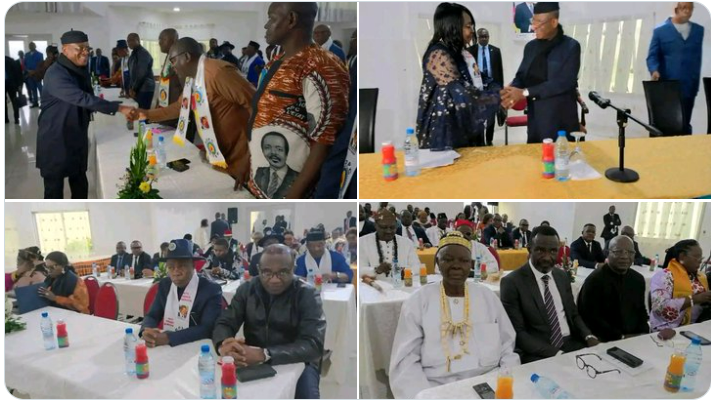Dion Ngute Rallies South West CPDM Elites Behind Biya’s Re-election—But Critics Say “It’s All a Farce”
By Andre Momo
In what observers describe as a carefully choreographed show of support for President Paul Biya, Prime Minister Joseph Dion Ngute concluded a closed-door strategy session with ruling party elites from the South West Region at the prestigious Mountain Hotel in Buea. The meeting, which gathered key political actors and youth representatives from the region’s six divisions, was designed to galvanize support for Biya’s 2025 presidential bid—his eighth run for office since taking power in 1982.
“The stakes are high, and the South West must stand behind the President,” Dion Ngute reportedly told the gathering, as per sources familiar with the discussions.
While official statements from the CPDM (Cameroon People’s Democratic Movement) portray the meeting as “a strategic and unifying event,” critics are calling it “a political farce”—one more instance of elite complicity in the continued marginalisation of the Southern Cameroons.
Behind Closed Doors, Familiar Messages
This meeting marks the second time this year that South West CPDM elites have convened to lay groundwork for Biya’s re-election campaign. Yet, no official press conference was held afterward, and media access was restricted. According to leaks, discussions centered on voter mobilization, media counter-narratives, and youth engagement tactics—particularly in areas that have historically boycotted national elections due to the ongoing Anglophone crisis.
The timing of the meeting is significant: it came just days after the national electoral board, ELECAM, published the final list of 13 presidential candidates. Among them is 92-year-old Paul Biya, still the standard-bearer of the CPDM and the oldest candidate in the race.
Critics: “What Has CPDM Done for Southern Cameroons?”
Despite efforts to project regional unity and political engagement, disillusionment runs deep in the South West and North West regions—known collectively as Southern Cameroons. Activists and citizens alike argue that these closed-door gatherings are tone-deaf and detached from the daily realities of suffering, insecurity, and displacement caused by the unresolved Anglophone conflict.
A widely shared reaction from civil society activist Derek Manka on social media sums up the prevailing sentiment:
“You hold secret meetings in luxury hotels while villagers are sleeping in forests. You talk of elections when schools and hospitals are still burnt shells. What exactly has the CPDM done for Southern Cameroons except manage its decay?”
Others point to the selective nature of CPDM loyalty. The ruling party continues to present a united Anglophone front during elections but fails to advocate meaningfully for federalism, local autonomy, or post-conflict reconstruction in the Anglophone regions.
A Region Still at War, Yet Expected to Vote
More than eight years into the Anglophone crisis, the South West remains a region under siege. Sporadic gun battles between separatist fighters and Cameroonian security forces persist in areas like Muyuka, Ekona, Mamfe, and Lebialem. Hundreds of thousands remain displaced, and voter turnout in the two Anglophone regions was below 10% in the 2018 presidential elections.
In this context, critics argue that mobilizing the South West for Biya’s re-election is not just futile—it’s morally bankrupt.
“This is not democracy. This is performance politics,” said political analyst Dr. Lilian Fonke, adding, “The CPDM is more interested in the optics of regional support than in addressing the structural causes of the crisis.”
Conclusion: Politics as Usual in an Unhealed Land
As the 2025 election season unfolds, the Prime Minister’s meeting in Buea may go down not as a turning point, but as yet another reminder of how far removed Cameroon’s political elite are from the lived experiences of the people they claim to represent—especially in the Anglophone regions.
For many in Southern Cameroons, the real question is not who wins the election, but why the system remains unchallenged, and why elites from their own regions continue to legitimize it.
“Let them meet. Let them strategize. But the South West they speak of is still bleeding.”





